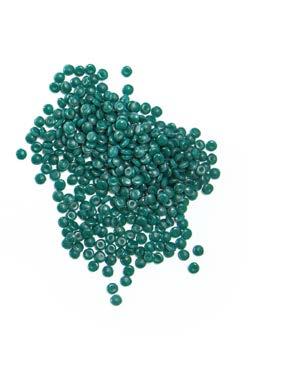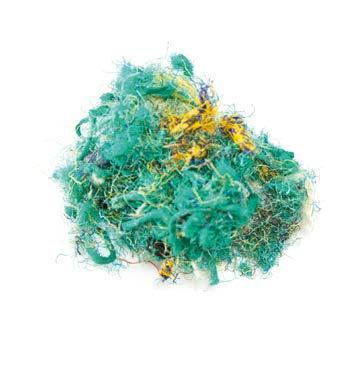
4 minute read
R-Cycle
PE-HD, PP as well as mixed regranulates are produced from the post-consumer fishing nets and ropes. The better the input materials are sorted, the more individually the regranulates can be produced. Picture: Plastix

mint, blue and black, sometimes mixed with virgin material according to customer specifications. While the PP grades are generally suitable for both injection moulding and extrusion and less so for blow moulding processes, the PE-HD grades are suitable for extrusion and blow moulding and some are also suitable for injection moulding.
FROM VISION TO REALITY
When founding their company Plastix in 2012, the two owners were obviously already aware of the problem of marine littering, but that there would be such specific rules and plans across the EU as are now coming into force was a vision at the time. It is true that transitional rules apply to fishing nets, in contrast to disposable articles, which have been banned since 3 July this year, but there are clear guidelines for these as well. To curb pollution from lost plastic fishing nets, the EU plans to record all fishing nets sold from 2022 onwards and match them with the old nets collected at or in the sea. At the end of December 2024, minimum quantities are even to be introduced that must be collected by coastal states for recycling. “For us, these are positive signals,” says
Fenella Metz, “on the one hand, these regulations prove that we are on the right track. On the other hand, they support us in our efforts to close the material cycle again. This way, actors are forced to bring post-consumer goods back on land.”
Material flows, appreciation and further business growth are thus ensured, she said. Already, more and more customers are buying the regranulates from Denmark and thus making their contribution to the circular economy.
With Epsotech Denmark in Tistrup, there is even a first customer who buys the regranulates in order to produce new ropes from them and thereby close the material cycle. “From rope to rope” is the slogan of the specialist for the production of technologically sophisticated monofilaments made of PE and PP, who is very positive about the material quality of the recycled goods: “Comparable to new goods, but with a better story.”
This text was published in an editorial article of the German K-Profi magazine, edition 9/2021 Text: Dipl.-Ing. (FH) Karin Regel, Editor K-PROFI Best Practice Post Industrial Recycling
GENERATION CHANGE AT OKUV BLAIMSCHEIN
> PIONEERING PLASTICS RECYCLING COMPANY CONTINUES TO RELY ON EREMA TECHNOLOGY IN THE FUTURE <
In Austria, the beginning of plastics recycling is inseparably linked with the name Osterberger Kunststoff Verwertung (OKUV) Blaimschein. Karl Blaimschein, who founded the company in 1974 on his agricultural estate, the Osterbergergut in St. Marien, Upper Austria, is considered a pioneer in plastics recycling. His son, Karl Blaimschein Junior, involved the company in contract recycling as a specialised niche supplier for industrial partners in plastics production. On the 1st of June 2021, Michael Blaimschein took over the family business as the third generation.
During the first few years, OKUV focused on recycling fertiliser bags and agricultural film material, which until then had mostly been disposed of. To collect the waste material, the company founder was able to get the assistance of the local fire brigades, who collected the material and brought it to special collection points for a fee. Over the years, the range of materials to be processed has gradually expanded significantly. Today, OKUV focuses on grinding and pelletising clean plastic waste (PE, PP, PS, ABS and PC) such as films, closures and sprues, which it does on a contract basis for more than 40 industrial partners in Austria and neighbouring regions. As a recycling service provider, the company also takes care of logistics and interim storage, depending on customer requirements.
SUCCESSFUL WITH EREMA AS TECHNOLOGY PARTNER
OKUV Blaimschein's technology partner since the early 1990s is EREMA. This partnership began with the trial takeover of a test plant in 1994. Just one year later, OKUV put its first new EREMA system into operation. Two more followed over the next two years, including the 1,000th machine

CEO Michael Blaimschein with his predecessor and father Karl Blaimschein.
EREMA had built in total up to that point. “For us, it was always crucial to achieve the highest possible quality of recycled pellets. That's why we kept a close eye on the development work at EREMA and finally decided to switch to this recycling technology when we gradually phased out our six plants from the early days. Since then, we have had the best experience with this technology,” says Michael Blaimschein, who emphasises not only the recycled pellet quality but also the high process stability and ease of operation of the EREMA machines. He has also already ordered a new INTAREMA®
TVEplus® machine, which is scheduled to start operation in October.
The INTAREMA® TVEplus® machine with SW filter that entered production at OKUV Blaimschein in 2015 received special branding to mark the milestone birthday Karl Blaimschein was celebrating at the time.










